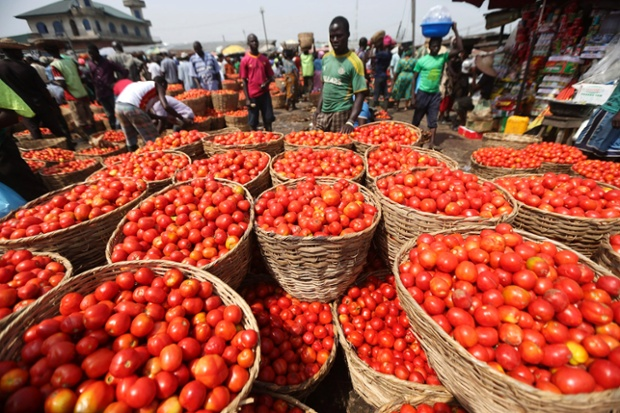Nigeria became a butt of international jokes when she banned importation of 41 items, one of which is tooth pick, considered non essential to warrant allocation of hard earned foreign exchange, fx from the Central Bank Of Nigeria, CBN for its importation.
Following the ban,an International media outfit, The Economist magazine published an article with the blistering headline “Nigerian Currency: Tooth Pick Alert” in parody of Nigeria’s new fx regime,to the chagrin of CBN governor, Godwin Emefiele.
The policy of exempting tooth pick importers from sourcing fx from the CBN is underscored by the fact that the country is basically forested with huge mangrove in the south and Savannah in the north.
As such, it was not only scandalous but preposterous that tooth picks which are basically pointed tiny sticks used for removing meat or food crumbs from human teeth, should be such an fx guzzler when it could be produced very easily, locally and much more cheaply for Nigeria to become self sufficient in it and even export to earn fx.
Advertisement
Until the recent slump in crude oil price and the consequential drop in fx flow into the CBN-resulting in inability of Nigeria to meet demand for fx to drive international trade- humongous amounts of fx had been allegedly applied in ‘importing’ mundane items like tooth picks, candle wax etc.
The truth is that without robust institutional safeguards against abuse and circumvention of rules and processes, unscrupulous businessmen are bound to game the system and this is not peculiar to Nigeria hence some of the transactions in mundane items like tooth pick are mere smokescreen for the crime of round tripping of funds.
In the advanced economies, commercial laws such as anti trust, anti arbitrage etc are enacted to protect vulnerable businesses from being hurt by malpractices of a few unscrupulous businessmen and women who cleverly bend, but dont break the rules and thus escape punishment.
Advertisement
While tooth pick is not an essential part of the menu of an average Nigerian,because it has no gastronomic value , tomatoes are, which is why the scarcity of the commodity is now creating so much hue and cry in the polity not because it is banned, but for other extraneous reasons.
Who could have thought that tomato crop which flourished in the north eastern part of Nigeria would virtually vanish from the markets without extreme weathers of severe drought or over flowing of rivers resulting in floods being the cause?
Today, tomatoes have become so scarce that the price has been spiked by nearly five folds from N4,000 to N19,000 per basket and the initial simple reason is because farmers have been unable to grow the crop because the north eastern part of Nigeria which is the foremost tomatoes growing zone, has been under siege by Boko Haram terrorists.
Yes, Boko haram atrocities have indirectly led to drastic reduction in the farming of tomatoes in Nigeria, leaving unpalatable taste in the mouth of most Nigerians ,just like Taliban terrorist activities have resulted in a drop in opium production in Afghanistan,resulting in a fewer number of Afghans addicted to the drug.
Advertisement
As a result of further investigations carried out by the federal ministry of agriculture, we now know that terrorism induced disruption of farming activities is not the only culprit for the scarcity of tomato in the market.
A debilitating disease known as ‘tuta absoluta’ is actually the real cause and terrorism is the secondary cause.
According to the minister of agriculture, Audu Ogbe,the pest which entered Nigeria from Niger Republic was first identified in South America in 1912 before it spread to Europe, then east and west Africa.
Unfortunately ‘tuta absoluta’ does not respond to ordinary pesticides hence it would cost N5 per tomato crop to be recovered from the disease.
Advertisement
Although the tomato disease outbreak has been around at about same time that Ebola was spread into Nigeria from Liberia by one Mr Sawyer, the disease was not quickly identified and tackled like Ebola for two simple reasons:
First ,unlike Ebola which affected human beings, and was easily and quickly noticeable,tuta absoluta affected only vegetable plants, especially tomatoes, which was only noticeable by local farmers in terrorism ridden north east Nigeria where security of lives took precedence over crops.
Advertisement
Secondly, Ebola was first contracted in lagos, the heartbeat of lagos and one of the largest cities in Africa,as such the virus disease was tackled immediately with the best medical facilities in Nigeria , but tuta absoluta was ravaging crops in the remote north east, and the hotbed of Boko haram terrorists , where there was dearth of human and laboratory facilities to combat the disease as the priority for govt and civil society was geared more towards human security than on food security, especially since agricultural extension officers who could have tackled the disease were also trying to escape from Boko haram in protection of their own lives.
So without concerted efforts to halt the spread of the tomatoes disease in nearly two years ,unlike the commendable coordination between the federal and lagos state govt in quickly reining in Ebola, tuta absoluta disease was allowed to fester like an open and untreated sore and the consequence is the current tomato drought.
Advertisement
The tomatoes disease which could spread to other crops like potatoes etc, if not quickly managed reminds me of the rinderpest disease that killed cattle massively and resulted in meat shortage and spike in price sometime in the past in Nigeria.
Just like ‘tuta absoluta’ , rinderpest disease also came through Niger republic route into Nigeria which shows how porous our international borders are and speaks to why it has been so easy for Boko Haram terrorists to creep into Nigeria from the lake Chad region with common boundaries with Borno state, north east Nigeria which has been the hot bed of the terrorist group.
Advertisement
With fresh tomatoes disappearing from the kitchen tables of most Nigerians, following the inability of farmers to grow the crop and the damage done by disease ,the Chinese stepped in with their processed paste in sachets shipped into Nigeria to the consternation of local producers of tomato purée who allege that the Chinese imports are carcinogenic.
Before now, the likes of Erisco foods had been importing concentrates in drums which are repacked and retailed locally,but following president Buhari’s regimes push for diversification of the economy, Erisco embarked on local farming and processing of tomatoes.
However, due to the relatively cheaper price of the Chinese import being dumped in Nigeria , local producers such as Erisco foods are now being muscled out.
By so doing,the misfortune that befell the textile and vegetable oil industries which hitherto boosted the GDP of kaduna, katsina and Kano states by creating employment for the masses in that axis in the good old days,is about becoming the lot of tomatoes purée producers, due to dumping of cheap tomato pastes.
This is because anytime Nigerians import what could be produced locally, it amounts to exporting jobs abroad and destroying gross national product, GNP which is inimical to the economy.
So importation of cheap and perhaps sub standard tomatoes purée from China is more or less a crime of economic sabotage, more so because , the CBN specifically targeted the sector for financial support to the promoters of industries in the value chain, in order to drive home the point that Nigerians should embrace import substitution and backward integration to reduce pressure on the dwindling fx reserve.
President Buhari during a recent farewell audience with outgoing Iranian envoy, re emphasized his determination to pursue a policy of economic diversification when he told his audience “We are committed to economic diversification. Most of the things on our import bills can be produced here.And we are determined to achieve that self dependency”. That’s cheering news. Hopefully very soon, mr president would also reveal his specific plans on how he would ramp up on electricity power supply and guaranty freer and easier means of moving funds and machines in and out of Nigeria to facilitate his diversification effort.
Currently, the richest man in Africa, Aliko Dangote, who has increasingly been engaging in commercial activities focused on the specific needs of Nigerians-rice, sugarcane and wheat farming as well as flour mills, has now joined Erisco food in the production of tomatoes purée.
With capacity for local production ramping up following Dangote’s entrance into the market,authorities have started considering a ban on import but the move is being resisted by importers who have launched a counter offensive by basically claiming that the local manufacturers lack the capacity to satisfy demand.
The cat fight has spilled into the streets-newspaper advertorials -with the opposing parties engaging in media war.
Again, the current situation reminds me of the fight in the recent past,between Dangote cement and others who import bulk cement for re bagging. While Dangote contended that Nigeria can attain self sufficiency in cement production and would be able to subsequently export the commodity, advocates of continuous importation argued against ban on import of the essential building material for re bagging.President Musa Yar’Adua of blessed memory,sided with Dangote resulting in massive investment in cement production and the current status of self sufficiency and net exporter.
A similar battle was recently pitched between those who were pushing for local assembly of vehicles create jobs and dealers who were determined to continue to import based on the the argument that Nigeria lacked the infrastructure-functional steel rolling mill, steady power supply. Today, those in Favour have prevailed with at least fifteen, 15 European and Asian vehicle manufacturers setting up assembly plants in Nigeria.
If nothing else has been learnt, at least we know that both the cement factories and vehicle assembly plants are creating instead of losing jobs to foreigners in countries that Nigeria imports from so they are adding value to the economy.
The Association Of Agricultural Products &Equipment Manufacturers In Nigeria, APEMAN that are advocating for a ban has launched a blistering counter attack on the Association Of Stakeholders In Edible Consumer Products Into Nigeria who are pro importation and therefore insisting on maintaining the status quo.
In the counter submission, APEMAN allege that investigation by food and health administrators in Nigeria confirmed that the imported tomato paste contain harmful elements but National Food and Drug Administration and Control, NAFDAC muzzled the report.
According to them “The officials also confirmed that the bulking agents(i.e starch) which the wicked importers put into tomato pastes will put the lives of diabetic patients in danger because if they (diabetic patients) take the substandard tomato pastes, they will indeed be taking starch which could trigger a crisis and ultimately lead to death”. Continuing the allegation, APEMAN asked ” Are these importers saying they are not aware that more and more diabetic patients have been lost due to suddenly death caused by a sudden rise of their sugar levels which may have been triggered by ingestion of starch in the name of tomato paste more than their insulin can deal with”? Thereafter they came in with the clincher “Also, because of the little or complete lack of lycopene in these offending tomato pastes, Nigerian children are denied a very vital mineral i.e lycopene which is necessary mineral and anti oxidant very necessary for the development of children’s intellect. These importers strangely do not believe that Nigerian children deserve to receive the lycopene that children in other parts of the world take for granted”.
Now, these are very grave allegations as they concern life and death,especially as it also involves the growth and development of our children who are leaders of tomorrow,so it requires National Assembly, NASS urgent intervention.
Therefore,I urge the senators representing my state,delta -senators James Manager and Ovie Omo-Agege and members of House of Representatives – Leo Ogor, victor Nwaokolo,Amaechi Mkprakpor, Osai N Osai, Helen Oboro, and Solomon Awhinawhi to take up the matter in the interest of members of their constituent and Nigerians in general.
They should call for public hearing on the matter to chart the way forward and in fact, professionals in food technology and safety, as well as intellectuals with bias for gastronomic matters, should weigh in with research and survey findings to settle the matter in the best interest of all the stake holders.
Such atmosphere of debates over how to safeguard our lives and move Nigeria forward are what democracy should be about, as opposed to the bickering between the legislative and executive arms of govt over ‘padding’ of 2016 appropriation bill.
Disappointingly, questions about whether or not,legislators are entitled to imported N30m SUVs instead of patronizing made in Nigeria Innoson vehicles and other locally assembled ones ; why legislators should be earning jumbo salaries at a time Nigerians are literally feeding from the dustbin after 70% hike in fuel price ; and astronomical increase in electricity tariff and if the grandiose and opulent lifestyle of Aso Rock dwellers is not incongruous as well as contradictory to current reality of hardships being endured by long suffering Nigerians, should be agitating our minds, but they are largely ignored.
Much as we vilified British prime minister, David Cameron for labeling Nigeria as fantastically corrupt during the recent anti corruption conference, at least he recently demonstrated that he is leading by example when he purchased an ordinary $2,200 car for his wife for personal use.
The British PM could have opted for the state of the art Range Rover SUV or Jaguar saloon car, produced in Britain which could have been more befitting for his dear wife, but he preferred to live according to the dynamics of the prevailing economic situation in England, which happens to be one of the very few European countries that has so far bucked recession.
In conclusion, l would be gratified if it’s proven that local producers of tomato purée have developed enough capacity to satisfy domestic demand, so that importation of the commodity may be banned and registered as another victory for backward integration and import substitution policy of govt as well as relief on CBN for fx which would be in fulfillment of the much sought diversification of Nigerian economy.
If self sufficiency could be attained with respect to cement, it can be done with tomato purée, but in Nigeria where people often blame others for their misfortunes, it is already being alleged that the proposed ban is to serve the selfish interest of the new entrant in the tomatoes business , Dangote food.
Where ever there is subsidy-that’s actually what CBN financial intervention is- there is bound to be schism in Nigeria, so l’m not phased by the allegations and counter attacks.
Riding on the wave of optimism in the cement,auto and probably tomatoes production success stories , given the CBN’s financial intervention in local rice value chain and the recent boost in production in Jigawa state , rice may be the next to be ticked off on the list of commodities hitherto imported into Nigeria but now locally produced.
This would not only reduce pressure on Nigeria’s scarce fx income, but it would also ensure availability of the most popular staple food-rice ,which is a key component of president Buhari’s ultimate change agenda of lifting the poor masses out of poverty.
Magnus Onyibe, a development strategist and futurologist is a former commissioner in delta state and an alumnus of Fletcher School of Law and Diplomacy, Tufts University, Medford Massachusetts, USA.
Onyibe, a development strategist and futurologist is a former commissioner in delta state and an alumnus of Fletcher School of Law and Diplomacy, Tufts University, Medford Massachusetts, USA.







